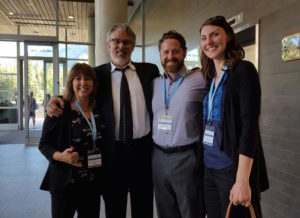By: Travis Slagle, MA
Horticultural Therapy Director/ Therapist
The world of mental health and neuroscience is built on a foundation of relationships. Whether it be the relationships among billions of neural pathways, or the relationships we contend with in our daily lives; human nature thrives on relationship and connection. We each learn to navigate the hopes and fears embedded in our families and communities, and the power that our relationships have to change our neurobiology. As a clinician with a passion for the restorative benefits of wilderness therapy and outdoor treatment, I have dedicated my career to utilizing nature as a “co-therapist.” At the recent International Neurosequential Model of Therapeutics® (NMT) Symposium in Banff Alberta, Canada, I had the opportunity to take my passion one step further by presenting with Pacific Quest’s Clinical Director and Pediatric Neuropsychologist Dr. Lorraine Freedle on the relationship between nature and neural integration. The symposium was attended by 700 delegates from 14 countries and featured keynote speaker Bruce Perry, M.D., Ph.D., Senior Fellow of The Child Trauma Academy and author of the best selling books Born for Love and The Boy Who Was Raised As A Dog.

L to R: Dr. Lorraine Freedle, Dr. Bruce Perry, Travis Slagle, Agata Freedle
During our research presentation, “Regulation to Resonance: The Neurosequential Model of Therapeutics® (NMT) in Nature-Based Treatment,” participants were introduced to Pacific Quest’s integrative clinical practice, which supports a neurodevelopmental approach to program design and implementation. Case studies and outcome data of Pacific Quest alumni post-treatment illustrated the efficacy of PQ’s NMT-informed and nature-based treatment approach. Building on the teachings of C.G. Jung and Dr. Dan Siegel’s theoretical framework of interpersonal neurobiology, the concept of “resonance” was defined as a dynamic state of attuned, embodied connection to self, others and the natural world.
Immersed in a fast-paced lifestyle, driven by technology and convenience, struggling teens and young adults often come to treatment overwhelmed by the demands of everyday life; they express feeling disconnected, addicted to distraction, and developmentally “stuck.” At Pacific Quest, we are proud to offer a truly holistic treatment approach that reminds us of our most fundamental need for deep and meaningful connection, and a reciprocal relationship with the natural world.
Pacific Quest Directors Present at NMT Symposium
By: Travis Slagle, MA Horticultural Therapy Director/ Therapist The world of mental health and neuroscience is built on a foundation of relationships. Whether it be the relationships among billions of neural pathways, or the relationships we contend with in our daily lives; human nature thrives on relationship and connection. We each learn to navigate the …
By: Travis Slagle, MA
Horticultural Therapy Director/ Therapist
The world of mental health and neuroscience is built on a foundation of relationships. Whether it be the relationships among billions of neural pathways, or the relationships we contend with in our daily lives; human nature thrives on relationship and connection. We each learn to navigate the hopes and fears embedded in our families and communities, and the power that our relationships have to change our neurobiology. As a clinician with a passion for the restorative benefits of wilderness therapy and outdoor treatment, I have dedicated my career to utilizing nature as a “co-therapist.” At the recent International Neurosequential Model of Therapeutics® (NMT) Symposium in Banff Alberta, Canada, I had the opportunity to take my passion one step further by presenting with Pacific Quest’s Clinical Director and Pediatric Neuropsychologist Dr. Lorraine Freedle on the relationship between nature and neural integration. The symposium was attended by 700 delegates from 14 countries and featured keynote speaker Bruce Perry, M.D., Ph.D., Senior Fellow of The Child Trauma Academy and author of the best selling books Born for Love and The Boy Who Was Raised As A Dog.
L to R: Dr. Lorraine Freedle, Dr. Bruce Perry, Travis Slagle, Agata Freedle
During our research presentation, “Regulation to Resonance: The Neurosequential Model of Therapeutics® (NMT) in Nature-Based Treatment,” participants were introduced to Pacific Quest’s integrative clinical practice, which supports a neurodevelopmental approach to program design and implementation. Case studies and outcome data of Pacific Quest alumni post-treatment illustrated the efficacy of PQ’s NMT-informed and nature-based treatment approach. Building on the teachings of C.G. Jung and Dr. Dan Siegel’s theoretical framework of interpersonal neurobiology, the concept of “resonance” was defined as a dynamic state of attuned, embodied connection to self, others and the natural world.
Immersed in a fast-paced lifestyle, driven by technology and convenience, struggling teens and young adults often come to treatment overwhelmed by the demands of everyday life; they express feeling disconnected, addicted to distraction, and developmentally “stuck.” At Pacific Quest, we are proud to offer a truly holistic treatment approach that reminds us of our most fundamental need for deep and meaningful connection, and a reciprocal relationship with the natural world.